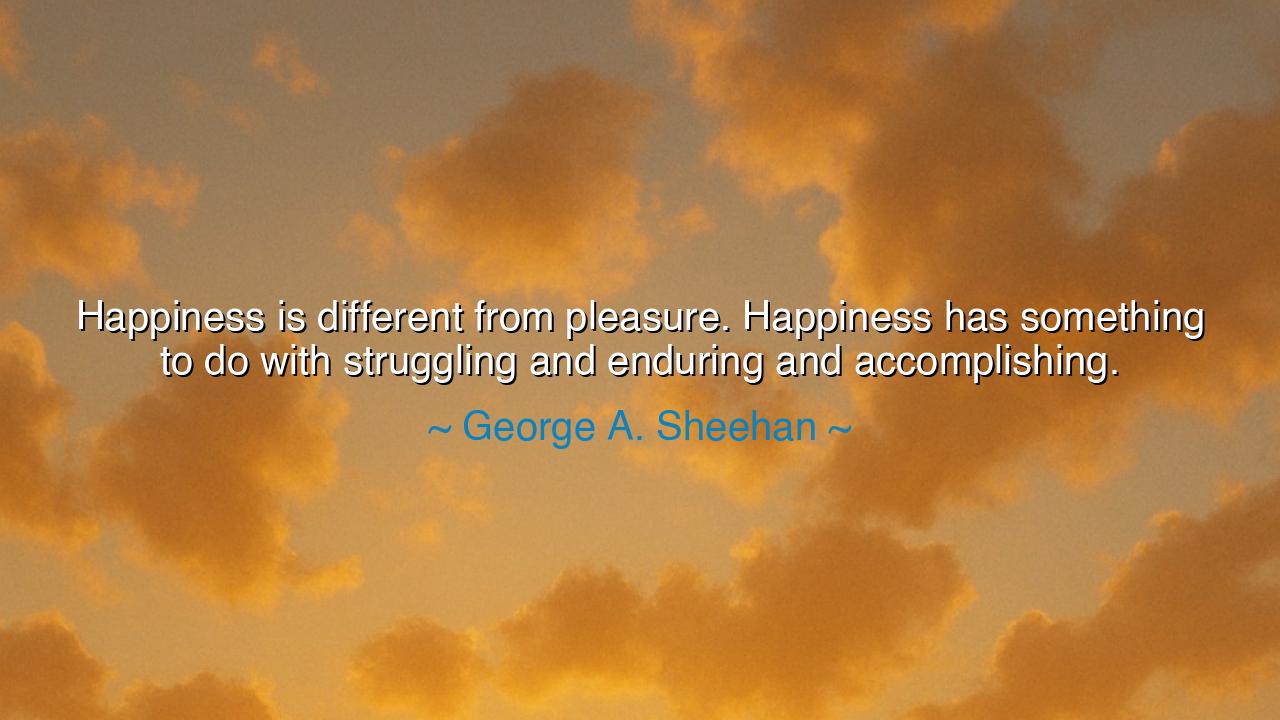
Happiness is different from pleasure. Happiness has something to
Happiness is different from pleasure. Happiness has something to do with struggling and enduring and accomplishing.






“Happiness is different from pleasure. Happiness has something to do with struggling and enduring and accomplishing.” Thus spoke George A. Sheehan, the philosopher-runner, physician, and seeker of truth who understood that the soul’s deepest fulfillment is not found in ease, but in effort. His words echo like the wisdom of the ancients, for he distinguishes between the fleeting sweetness of pleasure and the enduring radiance of happiness. Pleasure is the fragrance of the flower — bright, brief, and vanishing. Happiness is the root beneath the soil — unseen, strengthened by hardship, and growing ever deeper through the storms of life.
The origin of this teaching lies in Sheehan’s own journey. A doctor by profession and a writer by calling, he found spiritual revelation through the physical act of running. In his struggles on the road — through pain, exhaustion, and perseverance — he discovered a truth as old as time: that endurance refines the spirit. To run, he said, was to meet oneself; to struggle was to awaken. From this understanding came his philosophy — that true happiness is not the absence of pain, but the triumph over it. It is not a moment of delight, but a lifetime of meaning.
Sheehan’s insight carries the wisdom of many ages. The ancient Greeks, too, drew this distinction between pleasure and happiness. They spoke of hedonia, the pursuit of comfort and delight, and eudaimonia, the flourishing of the soul through virtue, struggle, and growth. Aristotle, that great teacher of balance, declared that happiness was the result of living with purpose — of striving to be excellent in deed and thought. He, like Sheehan, knew that ease softens the will, while struggle tempers it like iron in flame. The pleasures of the body pass like shadows, but the joy of accomplishment endures, nourished by the memory of what one has overcome.
Consider the life of Nelson Mandela, who spent twenty-seven years in a prison cell, enduring hardship and isolation for the sake of justice. There was no pleasure in those years, no comfort. Yet, when he walked free, his heart was radiant with happiness, for he had endured and emerged whole. His joy was not born from indulgence, but from sacrifice, from knowing that his suffering had meaning. This is the essence of Sheehan’s teaching — that happiness is the quiet reward of the soul that has endured, struggled, and accomplished. It is not handed to us; it is earned.
The world often confuses these two — pleasure and happiness — offering us comfort as if it were contentment, distraction as if it were peace. Pleasure is easy: it requires no courage, no discipline, no endurance. It soothes but does not strengthen. Happiness, on the other hand, demands participation in life’s full drama — the victories and the defeats alike. It asks us to take up the burdens of purpose and to face hardship not as punishment, but as the price of growth. For as the body grows through exertion, so does the spirit grow through struggle.
To struggle is to live, to endure is to grow, and to accomplish is to awaken joy. When a runner crosses the finish line, when a mother sees her child thrive after years of sacrifice, when an artist completes a work born of countless doubts — that joy is not pleasure. It is happiness: a joy that fills the bones, not the senses. Pleasure fades when the moment ends, but happiness deepens with remembrance. It binds us to the story of our becoming, to the nobility of having suffered and prevailed.
Therefore, my children, learn this truth: do not chase the comfort of pleasure and mistake it for happiness. Seek instead the strength that comes from striving toward what is good, even when it is difficult. Let your endurance become your teacher, your struggle your refinement, and your accomplishment your song. When pain visits you, greet it not as an enemy, but as a companion guiding you toward depth and wisdom. For the joy that arises from struggle well-lived is a flame that no storm can extinguish.
And so, as George A. Sheehan teaches, true happiness is not given; it is forged. It lives in the heart of the one who keeps running through life’s wind and rain, who endures when others give up, who transforms suffering into strength. Pleasure will give you rest for a night, but happiness will give you peace for a lifetime. Choose, then, not the easy path, but the meaningful one — and in your struggle, you will find not despair, but the radiant joy of a soul fully alive.






AAdministratorAdministrator
Welcome, honored guests. Please leave a comment, we will respond soon